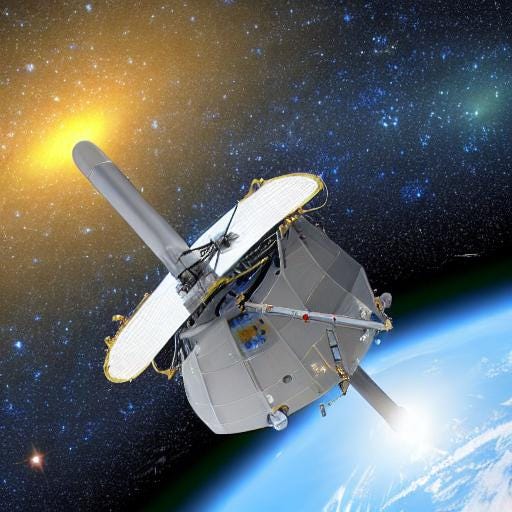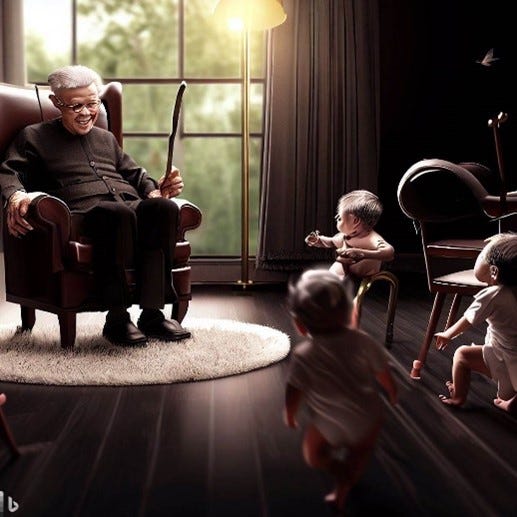Contentedness
And two good ideas from economics
Here is a small section from my unpublished novel entitled Peace in Our Time, written in 1999. The story is about a wealthy entrepreneur who decides to sneak a transmitter onto the Mars Observer so that he can broadcast a message to Earth ostensibly from aliens bent on invasion and destruction. The ploy is designed to bring about world peace by uniting everyone on Earth against the aliens but, sadly, it all goes sideways, leading to intense drama and some predictable plot twists, if I’m totally honest.1
The Mars Observer had just begun its nearly half a billion-mile journey to the Red Planet.
As planned, the communications antennae telescoped out and blossomed into a shiny dish. A set of calibration procedures was run, and the antennae pointed its way back to Earth. The Observer sent a test pattern to Arecibo in Puerto Rico and received the expected answer in return. A small gear rotated the antenna to lock it into place.
After communications were established and confirmed, a pair of much larger telescoping rods projected out into space. Again, the rods blossomed as four solar collection panels unfolded from each arm, rotating so that they directly faced the sun. If anyone could have seen it, they would have noted that the opening arms looked uncannily like the time-lapse photography from those nature shows of the sprouting of new seedlings in the spring.
Finally, Mars Observer ran through a series of check-out routines. Power coming in from the panels. Course confirmed. Communications re-checked. All systems are functioning normally. All backup systems functioning normally. If the probe could have felt contentment, at that moment, it would have.
I open with this story for two reasons.
First, no part of this novel was ever published so this will be the only time any of it sees the light of day.
Second, I have recently been puzzling over the feeling of “contentment” or “contentedness” and when I did, I thought of this passage and wondered why I thought that was the right thing for the probe to feel at that moment.
What brings about the feeling of being content? You take your last sip of coffee after eating a large, tasty meal. You place the last piece of a jigsaw puzzle. A grandfather sits on his favorite chair as his grandchildren play on the carpet.2
Though we might have an intuitive idea of what produces contentedness, not a lot has been written on the topic, as far as I can tell. When I ran a Google Scholar search using just the word contentedness, the first result that came up was a piece that ran in The Saturday Magazine… in 1833.
Following my usual pattern, this post asks what the feeling of being content measures and motivates.
To get at this, we’ll need two important ideas from economics.
The first idea is one of my favorites: opportunity costs. Whenever you’re doing something, there is a cost: whatever else you could be doing with your time. So the opportunity cost of writing this post could be, for instance, editing my novel because I can’t do both at the same time.3 Evolved psychology should take account of opportunity costs when making decisions about how to allocate time and effort.
The second idea is diminishing returns. For many sorts of activities, the reward you get for continuing gets smaller and smaller over time. Consider, say, a bear, exploiting a patch. When she starts, the berry bush is full of berries and she can get a lot of berries per unit time. As she collects berries, she has gotten all the low hanging fruit and it takes longer to find and harvest the next berry, so the berry-return-to-time declines. When the return gets low enough, she moves on, searching for the next patch to exploit.
So, if you’re an organism that can engage in many different activities—and most organisms can—an important function is evaluating whether to continue with the current one. As you continue a task and returns diminish, the sense of effort is there to motivate you to switch tasks. As yields diminish, opportunity costs loom larger: if the thing I’m doing has a small yield, the relative value of alternative activities is more attractive.
What do finishing a meal and watching your grandchildren play have in common? It’s seductive to say that there’s a sense that in both cases you’re done. If one is done, the marginal returns have diminished close to zero so there’s no use continuing. If there is no more value to try to eat another crumb—I’m completely sated—or have another child—I’m old—best not to allocate any more effort in that direction.
However, there are clear counterexamples, times we’re done but not content. The other day I finished a box of Reese’s Pieces while I was watching Oppenheimer, but I didn’t feel content. Similarly, sometimes I’m done with the first draft of a post, but I’m pretty far from content.
My suspicion is that the candy case and the first draft case are missing two important elements. In the candy case, I haven’t really completed anything that was genuinely worth doing. I’m still hungry and I didn’t get a ton of nutrients. In the draft case, while I might be “done” with the first draft, I’m not really “done” in the sense that there is still some work that I can put into it to improve matters. I haven’t hit my goal so the returns on my investment of time have not diminished to zero.
So, one guess is that contentedness is measuring something like, am I done?, but with a slight nuance having to do with can I do anything more to improve the outcome? It’s not exactly just measuring if one is finished with whatever one is doing. One might complete, say, a work of art—or a novel—that is, in a word, awful, and one would not exactly feel content about it. So contentedness seems to be answering a set of questions:
1. Have I completed a task?
2. Did the task advance some (reasonably) important objective or goal?
3. Is it done in a way that is good or close to whatever my goal was?
4. Have I reached the point at which returns have diminished to zero or close to zero?
As answers to these questions are increasingly resoundingly yes, the feeling of contentedness rises.
This series of questions seems to capture my intuitions about the space probe. The probe (1) completed its (2) important tasks—extending sensor arrays, equipment checks—(3) successfully and (4) couldn’t really do anything else useful in terms of its mission exploring Mars until it, well, got to Mars.
No wonder it was content.
So, according to this view, what is being measured is the successful completion of some task or set of tasks, for which the marginal benefit of continuing is small to zero.
What does contentedness motivate? When I think about the probe, the person at dinner, the jigsaw puzzler, and the grandparent, it seems to me that what is being motivated is, more or less, inaction. As with the case of the sensation of effort, contentedness is a kind of a stop signal. Both effort and contentedness say to stop because the marginal returns are low. But in the case of effort, the marginal returns are low because there is still work to be done, but it’s not very useful work relative to the cost. There might be the stray berry still left in the bush, but it’ll take a while to get to it. Physical effort has the same pattern: as one becomes increasingly fatigued, effort is a signal telling you that you can continue, but you only should continue if there is a big benefit of doing so.4 In contrast, when you’re content, you’ve gotten the last berry. It’s not that it’s not worth it, it’s that you’re done. What effort and contentedness have in common, however, is that they motivate stopping. Effort tells you to stop unless you have a good reason to continue. Contentedness tells you to stop, well, full stop.
How is contentedness different from satisfaction?5 Occasionally, one sees the two presented as synonyms, and they do seem similar, but I’ll venture a guess about how to tease them apart. There are things out in the world, such as YouTube videos, that people report are very satisfying to watch. It seems to me that we don’t often feel contentedness with something others have done, but we do feel satisfaction with some of those things. So there seems to be a sense in which contentedness is directed at oneself, and is a stopping emotion, while satisfaction seems to at least sometimes be about seeing what others do, perhaps as a learning emotion.
My view of contentedness as a stop emotion is bolstered by the fact that its opposite, discontent, seems to be a start emotion. In the most famous book bearing this word in the title, discontentedness spurs Ethan to action, stirring his ambition.6
Finally, does contentedness have its own facial expression? Generally, the expression we associate with this feeling is a relaxed brow with a slight smile/raised cheeks with dimpling around the eyes, which are often closed. The slight smile is consistent with the general positivity of the emotion and the closed or lowered eyes are consistent with a stop as opposed to a go signal.
Contentedness, then, seems to be a positive emotion measuring the successful completion of a task at different levels of abstraction for which additional effort will yield limited or zero returns. It motivates inaction, because all is, as in the case of the Mars Observer, going just fine.
Full novel available on request, especially if you are a literary agent. There is also a screenplay if you’re interested.
I asked ChatGPT to craft three vignettes at the end of which the character feels content, to see if these capture what other people think creates this feeling. They don’t seem to diverge too much from mine.
This cost is very low given the marginal benefit of editing the novel. An economist will tell you that as a technical matter, the way to think about opportunity cost is the next best thing you could be doing with your time, effort, or money, not just anything at all.
It’s hard to complete a challenging workout, but people are more likely to persist in the face of the discomfort of effort if they are in a social setting or are being chased by a lion, for example.
A post on satisfaction is in the works.
The Winter of our Discontent, by John Steinbeck.






Also interesting to ponder *perfectionism* as an extension of what you covered here. I was just thinking about how the perfectionist (unhealthily) keeps going beyond a natural point of contentedness, even though there are diminishing returns (in the augmented quality of end product) and minimal added contentedness the further he goes, and yet... the perfectionist carries on, continually seeking some higher level of achievement/excellence that he never actually arrives at. Seems like the perfectionist is driven by an irrational obsession, rarely landing at actual contentment, but sort of spinning his wheels while getting nowhere (at least seemingly nowhere to most "regular" people, since most everyone would never notice the difference between 99.99999% and 100%.)